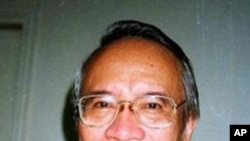Sixteen years ago, the United States Congress designated May 11 as Vietnam Human Rights Day to highlight U.S. support for protecting and promoting basic freedoms in Vietnam. A ceremony and discussion forum was held today at the U.S. Capitol to mark the occasion, involving members of Congress, labor leaders, non-governmental groups and representatives from Vietnamese communities across America.
The date marks one of the most prominent episodes in domestic advocacy of human rights in Vietnam. On May 11, 1990, Vietnamese physician, Dr. Nguyen Dan Que, and other activists published a “Manifesto for the Non-Violent Movement for Human Rights in Vietnam.” The Manifesto called for peaceful advocacy against repression and called on the government to respect basic human rights, accept a multi-party political system and allow free and fair national elections. Dr. Que and his fellow advocates were arrested and convicted of crimes against the state. Dr. Que has been closely monitored by Vietnamese Government authorities since his release from prison in 2005.
The United States and Vietnam have made great strides in normalizing relations and expanding trade, and economic growth has brought great improvement to the daily lives of many Vietnamese. But the Hanoi government's record on human rights still gives pause. While there has been some progress on expanding religious freedom, the government continues to place severe restrictions on freedom of speech and the press and has a history of arresting and convicting those who openly criticize government policies.
Differences over human rights are the prime point of contention in an otherwise flourishing bilateral relationship with Vietnam. U.S. concerns over human rights arise out of a genuine desire for Vietnam to enjoy continued sustained stability and prosperity, and we believe that expanding rights and freedoms not only are compatible with growth and stability, but in the long-run are their prerequisites.
Vietnam Human Rights Day

Sixteen years ago, the United States Congress designated May 11 as Vietnam Human Rights Day to highlight U.S. support for protecting and promoting basic freedoms in Vietnam.



